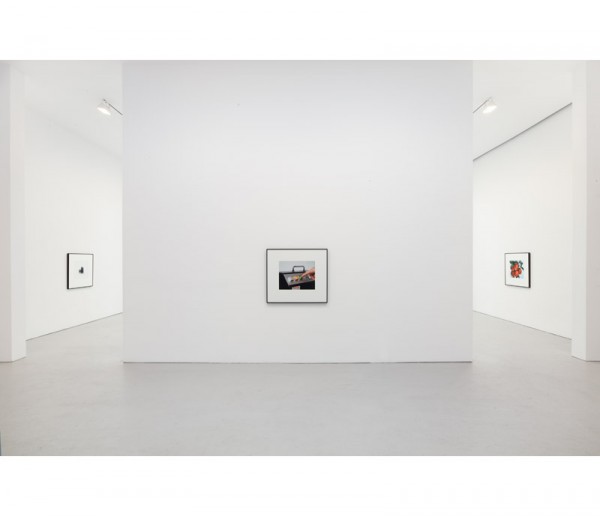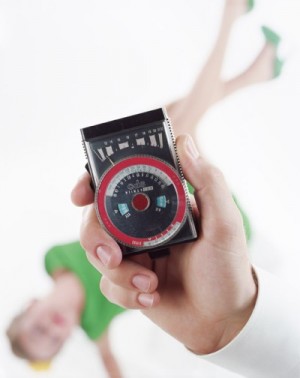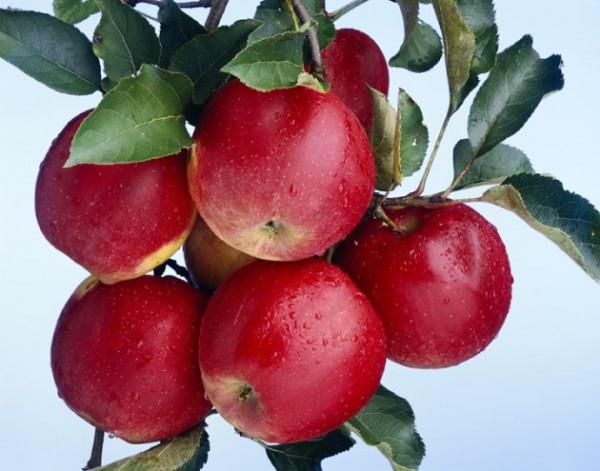-
No Use of You Running: Christopher Williams at Zwirner
by Stephanie Harris February 12, 2011

Highly polished visuals appear commercial in their flawlessness. Sincerity becomes increasingly hard to perceive against the context of advertising, of mass demographics, of no context. Efforts to represent truth become local and hopelessly baroque. In the rare moments when they appear unexpectedly, traces of order or exertion are immediately suspicious. Avoiding compromise, appeasement or untoward collaboration is not only an artist’s full time job, but a life’s work; still, the photos that line the walls at David Zwirner are a bit too realistic for comfort.
Christopher Williams titled his show For Example: Eighteen Lectures on Industrial Society. But although we’ve been prepared for instruction, we don’t find it forthcoming. Connotations are stretched to meet one another like a game of Pictionary in the space between photos. Dry cleaners, apples, dark room supplies, a Miro sculpture: his various symbols model for one another within their expanded system.

Williams’ work isn’t difficult, it’s just a bit harder. His is the shiny difficulty of runway conceptualism. Production value is one obstacle; lengthy and detailed captions that accompany each photo are another. These last operate in pointed excess of the purpose Benjamin set for them:
“Captions must begin to function, captions which understand the photography, which turns all the relations of life into literature, and without which all photographic construction must remain bound in coincidences.”
Rather than turn relations of life into literature, the title of the image of a camera cutaway, Camera: Praktika, Praktisix (1959-64), Kamera- und Kinowerke Dresden, 120 film 6×6 cm, height: 11 cm, width: 16.5 cm, depth: 12 cm, weight: 1280 g, Lens: Carl-Zeiss-Jena, Tessar 1:2,8 80mm, normal lens: Biometar 80/2.8, lens mount: Praktisix Bayonet, typical serial no: 20830 aims to turn them into matters of industrial precision. Both the enthusiasm of the images and the captions’ semiotic austerity are ambitious in similarly antiquated ways. By deflecting us back onto the image a second time, the caption rehearses the eclipse of literature; its space filled with a stream of instrumental measurements. This unavailability complicates the appeal of the image, leaving it bound, as it were, in coincidences. Both aspects of the work aim to impress us with their insensitivity: the artless polish of the images offends our taste while the captions’ conceptual commitment wears us out. When their marriage comes into focus the room begins to feel claustrophobic.
Weimar Lux CDS, VEB Feingerätewerk Weimar, Price 86,50 Mark GDR Filmempfindlichkeitsbereich 9 bis 45 DIN und 6 bis 25000 ASA, Blendenskala 0,5 bis 45, Zeitskala 1/4000 Sekunde bis 8 Stunden, ca. 1980, Modells: Ellena Borho and Cristoph Boland, is an alluring image of a light meter before an out-of-focus woman sprawled in a green dress. Williams writes:
To focus is to assert a preference for one surface over another. To choose between the light meter or the green dress. How to represent them? Let’s say that both, on that afternoon, trembled slightly.
Here the original function of the caption is relocated to the press release. Each model’s name becomes one possible setting among others, and the image is a serving suggestion.

Less obvious connotations emerge in the photos without explicative mini-texts. Industrial eco-systems lurk in images ostensibly depicting individual or naturalistic simplicity. In Bergische Bauernscheune, Junkersholz, Leichlingen apples are captured in a state of perfection moments before they’re picked, crated, and distributed. A rolled bale of hay in Naturpark Schwarzwald Mitte/Nord neben Bergach gestures at an unseen process. Even the image of a mop leaning on an office wall, Staatliche Kunsthalle Baden-Baden, Lichtentaler Allee 8a, Baden-Baden, Germany, invokes a broader system.
While reading the press release, I noticed Williams’ inclusion of lyrics from the Canned Heat song, ‘Going up the Country’. The song is a romantic vision of escaping to the countryside, and it is jolly and buoyant in its irony and its cynicism.
Garten in Voigtmichelshof, Alpirsbach, an image of fragile green leaves shimmering in the sunlight was perplexing in its simplicity. Perhaps there is an echo of industry rumbling in the background, I thought; but instead of harvesting, preparing, or packaging the subject of the image, the echo just dances around it. Unlike the apples, these leaves will simply fall to the ground when the seasons shift. At this point I was performing my own act of extraction. Rather than allowing the leaves to exist pleasantly in isolation, I was mining them for significance.

So I returned to the press release. Gradually, the echo of industry was drowned out as the leaves started singing, “I’m going up the country, babe don’t you wanna go… I’m gonna leave this city, got to get away…” I felt Williams exude a sigh of relief, soothing my ambition to engage and I tapped my foot to the naive jubilation of Canned Heat.

